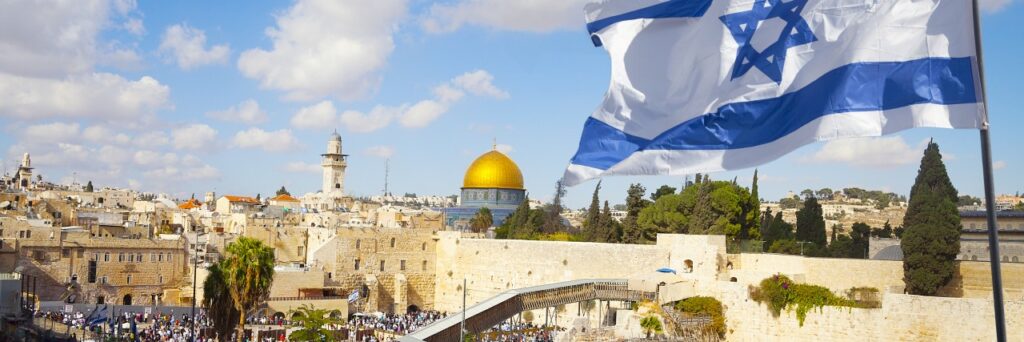
With the October 7, 2023, Hamas massacre that left over 1,400 Israelis and foreign nationals dead and more than 243 held hostage, there have been renewed attempts to rewrite history and assert that Jews are “foreign occupiers” with no ties to the land of Israel.
Among the lies being spread is an effort to undermine Israel’s legitimacy by accusing it of being a settler-colonial state. Those spreading this lie argue that Jews have no historical connection to the land of Israel and that Zionists – those who support the right of Jewish self-determination and national home
land in the land of Israel – came to colonize the land, taking it from the Palestinians beginning in the late nineteenth century. However, this claim ignores the thousands of years of deep connection between the Jewish people and the Land of Israel.
Here are five facts about the long history of the Jewish people’s ties to the land of Israel.
- Jews have had a continuous presence in the land of Israel.
 While the Romans expelled the majority of Jews in 70 CE, the Jewish people have always been present in the land of Israel. A portion of the Jewish population remained in Israel throughout the years of Jewish exile while the rest settled around the world and became the Jewish diaspora. In particular, Jewish communities existed throughout much of this period in what is known as the Four Holy Cities: Jerusalem, Hebron, Safed (Tzfat), and Tiberias. Jerusalem is the most sacred, known for the Western Wall. Hebron is associated with the Cave of the Patriarchs, the traditional burial site of several important Biblical figures. Safed became the center of Jewish mysticism in the sixteenth century. Tiberias is notable for the Jerusalem Talmud during the Byzantine Period.
While the Romans expelled the majority of Jews in 70 CE, the Jewish people have always been present in the land of Israel. A portion of the Jewish population remained in Israel throughout the years of Jewish exile while the rest settled around the world and became the Jewish diaspora. In particular, Jewish communities existed throughout much of this period in what is known as the Four Holy Cities: Jerusalem, Hebron, Safed (Tzfat), and Tiberias. Jerusalem is the most sacred, known for the Western Wall. Hebron is associated with the Cave of the Patriarchs, the traditional burial site of several important Biblical figures. Safed became the center of Jewish mysticism in the sixteenth century. Tiberias is notable for the Jerusalem Talmud during the Byzantine Period.
- Israel was under Jewish leadership for hundreds of years in antiquity.
The ancient history of the land of Israel includes many centuries during which the land was governed by the Jewish people. Beginning in approximately 1000 BCE, which was the beginning of the Iron Age, under King Saul, David, and Solomon, the entire land of Israel was under a unified Jewish kingdom. The Unified Kingdom, as it is known, was divided in approximately 931 BCE into the Kingdom of Israel (Northern Kingdom) with its capital in Samaria, and the Kingdom of Judah (Southern Kingdom) with its capital in Jerusalem.  Both kingdoms remained under Jewish rule. The Northern Kingdom was conquered by the Assyrian Empire in 722 BCE and most of its inhabitants were exiled, but the Southern Kingdom remained under Jewish rule until 586 BCE when the Babylonian Empire conquered it, exiling many Jews.
Both kingdoms remained under Jewish rule. The Northern Kingdom was conquered by the Assyrian Empire in 722 BCE and most of its inhabitants were exiled, but the Southern Kingdom remained under Jewish rule until 586 BCE when the Babylonian Empire conquered it, exiling many Jews.
The Jews returned from exile under the Persian Empire and regained control over the land with the Hasmonean dynasty in the 2nd century BCE. Judea, as it was then called, became a client state of Rome in 63 BCE, and the Herodian dynasty, a Jewish dynasty under the control of Rome took over. In 70 CE, the Romans destroyed Jerusalem and exiled many of the Jewish inhabitants of Judea.
These kingdoms played crucial roles in shaping Jewish history, religious traditions, and cultural identity, with the city of Jerusalem and the two great Temples that once stood there holding special significance in biblical narratives and Jewish history.
- Jerusalem is the holiest site in the Jewish faith.
 Jerusalem has been the spiritual, religious, and national center of the Jewish people for thousands of years. Approximately 3,000 years ago, under the rulership of King David, Jerusalem became the capital of Israel. Jerusalem was the site of the two great Temples, the centers of Jewish worship for hundreds of years. The first Temple was built by King Solomon during the tenth century BCE and destroyed by the Babylonian Empire in 586 BCE, who laid siege to the city of Jerusalem, flattening the holy city and also forcibly exiled Judeans from the Kingdom of Judah.
Jerusalem has been the spiritual, religious, and national center of the Jewish people for thousands of years. Approximately 3,000 years ago, under the rulership of King David, Jerusalem became the capital of Israel. Jerusalem was the site of the two great Temples, the centers of Jewish worship for hundreds of years. The first Temple was built by King Solomon during the tenth century BCE and destroyed by the Babylonian Empire in 586 BCE, who laid siege to the city of Jerusalem, flattening the holy city and also forcibly exiled Judeans from the Kingdom of Judah.
The second Temple was built less than a century later, and destroyed in 70 CE by the Romans, who also destroyed the Jewish capital and forcibly exiled most of the Jewish inhabitants. The loss of the Temple had a profound impact on the Jewish faith.
Even after the destruction of the Second Temple and the exile of Jews from the land, Jerusalem remained central to Jewish life – and it is still central today. No matter where Jews pray, they always face the direction of Jerusalem. The Western Wall, the last remaining wall from the Second Temple structure, is the holiest site in the world for Jews. At Jewish weddings, the groom traditionally breaks a glass in memory of the destruction of the Temple. At the end of the Passover Seder, Jews recite “Next year in Jerusalem!”
- While in exile Jews never stopped yearning to return to Israel.
Despite being scattered throughout the world during various points in history, the Jewish people maintained a strong connection to the land of Israel through religious practices, prayers, and an enduring hope of eventual return.
 Diaspora Jews yearned to return to the Jewish homeland and the holy Jewish city of Jerusalem, both of which are mentioned multiple times in daily Jewish prayers.
Diaspora Jews yearned to return to the Jewish homeland and the holy Jewish city of Jerusalem, both of which are mentioned multiple times in daily Jewish prayers.
Traditional Jewish religious thought stated that the Jews had been exiled from their homeland as a punishment from God. They could only return in Messianic times. This belief kept most Jews from thinking about a return to living in Israel.
But, in the nineteenth century, as European Jews suffered from growing antisemitism and violence against them, a new ideology was born – Zionism, a national liberation movement of the Jewish people. Zionists saw a return to the Jewish homeland as the path to Jewish redemption from thousands of years of oppression. Small groups of Zionist pioneers began returning to their ancient homeland in the late nineteenth century, joining the community of Jews who had never left.
The establishment of the State of Israel in 1948 realized the long-held dream of a Jewish homeland, and it has since become the center of Jewish identity and culture for millions of Jews worldwide. Israel is seen as a place of refuge, a cultural renaissance, and a symbol of Jewish self-determination.
- Israel plays a central role in the Bible.
 The land of Israel is central to the Jewish faith and is mentioned throughout the Bible. In the Book of Genesis, the first book of the Bible, God promises the land of Israel to Abraham, the first Jew, and then reaffirms the promise to Abraham’s son Isaac and grandson Jacob. In fact, the name Israel is another name for Jacob.
The land of Israel is central to the Jewish faith and is mentioned throughout the Bible. In the Book of Genesis, the first book of the Bible, God promises the land of Israel to Abraham, the first Jew, and then reaffirms the promise to Abraham’s son Isaac and grandson Jacob. In fact, the name Israel is another name for Jacob.
In the Book of Exodus, Moses leads the Israelites out of slavery and oppression in Egypt with a promise to take them back to the land of Israel, the land of their forefathers. The books of Judges and Kings relate the stories of Jewish rulers over the land of Israel, and many accounts in these books have been proven historically accurate by archaeological finds and Assyrian, Babylonian, and Persian sources.
www.ajc.org/news/5-facts-about-the-jewish-peoples-historic-connection-to-the-land-of-israel




